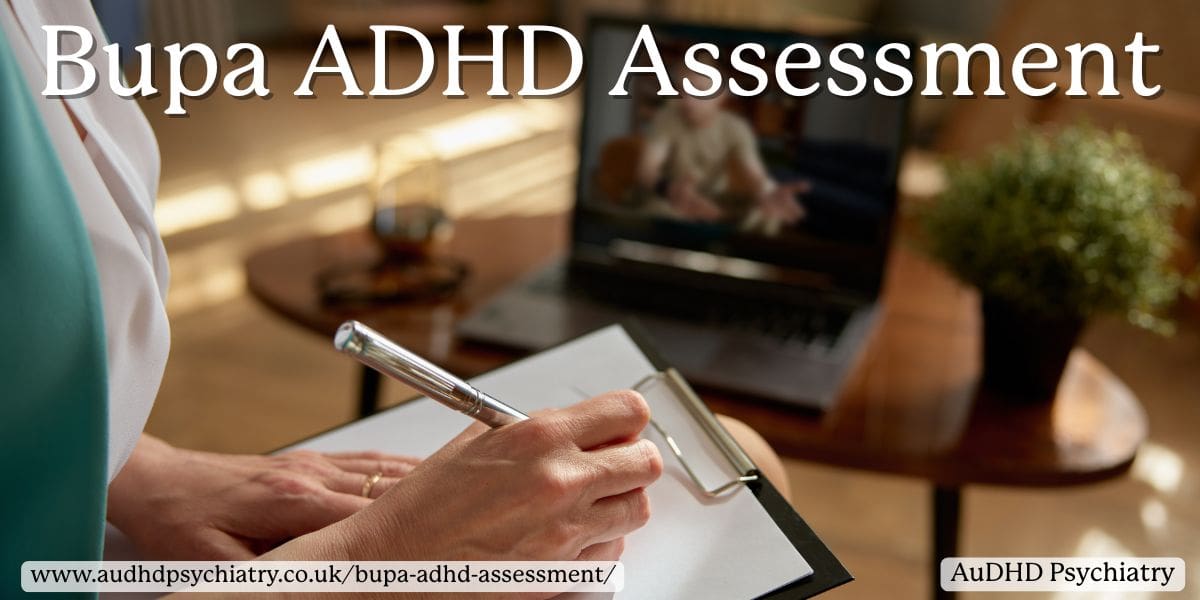
Your Guide to Bupa ADHD Assessment in 2025
Table of Contents
Key Takeaways
- Bupa funds ADHD assessments through AuDHD Psychiatry, allowing adults with suspected ADHD to receive comprehensive evaluations that consider individual symptoms and daily functioning.
- The initial consultation is a critical part of the diagnostic process, allowing clinicians to gather detailed information to ensure accurate diagnoses.
- Bupa-funded providers offer tailored treatment plans and ongoing support, sometimes utilizing a multidisciplinary team approach to effectively manage ADHD symptoms.
Are you looking for a faster route to ADHD diagnosis and support for yourself or a loved one? For many individuals, long NHS waiting times can delay the answers and support they need. Fortunately, Bupa-funded ADHD assessments through AuDHD Psychiatry offer a timely and professional alternative.
Attention deficit hyperactivity disorder (ADHD) affects four in every 100 people across the UK. This neurodevelopmental condition impacts individuals differently, influencing school, friendships, and family environments. If you’re wondering how to get tested for ADHD, accessing a Bupa-funded ADHD assessment through AuDHD Psychiatry shouldn’t feel overwhelming. Many individuals face long waits for NHS ADHD service diagnosis, often struggling without proper help during this time. Parents often seek ADHD assessments for their children due to the long wait times for NHS reviews.
AuDHD Psychiatry, in collaboration with Bupa and Onebright, offers private ADHD testing UK that typically takes just three months. This accelerated pathway matters, particularly when 75% of adults with ADHD also experience mental health challenges like anxiety. The process usually involves a combination of consultations, psychological evaluations, and clinician-led discussions.
Private ADHD testing in the UK can lead to improved daily functioning and better relationships, helping you understand and manage these challenges better. Patients have also reported an excellent experience with the thoroughness of ADHD assessments. You can also try our free ADHD test for adults for an initial self-check before booking.
This article outlines everything you need to know about Bupa-funded ADHD assessments, including what to expect at each stage, how to verify your insurance eligibility, and what your treatment options might look like. Whether you’re seeking answers for yourself or a loved one, this guide is designed to help you take the first step with clarity and confidence.
Considering private ADHD testing in Wales or elsewhere in the UK? Book a call with our team today and explore your options for a faster, more supported diagnostic journey.
Understanding Bupa ADHD Assessments
A Bupa ADHD assessment is more than just a diagnostic appointment. It’s a structured, evidence-based process designed to provide clarity and long-term support for those navigating the complexities of attention deficit hyperactivity disorder. These assessments are delivered through AuDHD Psychiatry in partnership with Onebright, offering high clinical standards for both adults and children.
Each assessment includes a full diagnostic assessment, comprising clinical interviews, behavioural evaluations, and standardised ADHD measures. The goal is not just to confirm a diagnosis but to understand how symptoms impact day-to-day functioning in education, work, and home life. This holistic insight helps form the basis of an effective treatment plan.
All evaluations are conducted by trained clinicians, including specialist consultant psychiatrists, with expertise in neurodevelopmental conditions. Bupa’s services reflect a commitment to high-quality mental health care, often delivered by multidisciplinary teams that include psychologists, nurses, and care coordinators.
Does a Bupa ADHD Assessment Lead to a Formal Diagnosis?
A Bupa-funded ADHD assessment can result in a formal clinical diagnosis when diagnostic criteria are met, supported by a written report that may be shared with GPs, employers, or educational institutions. Timely or early diagnosis offers significant benefits. Identification through Bupa allows for effective coping mechanisms, enabling better symptom management. The assessments are conducted by experienced clinicians, including specialist child and adult consultant psychiatrists, ensuring high standards of care and accurate diagnoses.
An ADHD assessment can be transformative for those experiencing symptoms like difficulty focusing, impulsivity, and inattentiveness. Bupa’s adult ADHD assessments greatly assist individuals struggling with organisation and daily functioning, equipping them with the necessary tools to thrive.
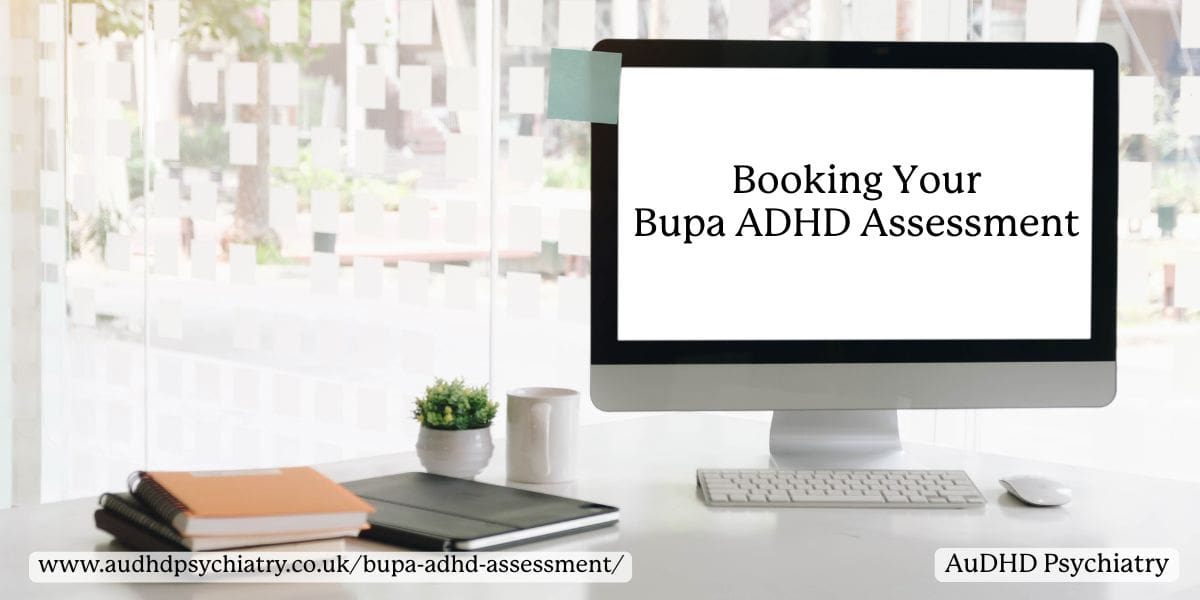
Booking Your ADHD Assessment through Bupa
Starting an ADHD assessment with Bupa through AuDHD Psychiatry is straightforward. Contact their client team via a form on the website or by phone. The team assists with bookings from Monday to Friday, between 9 AM and 6 PM. When booking, provide the policyholder’s name and the recipient’s details, and give consent for Bupa to process the provided information.
Bupa and AuDHD Psychiatry offer flexible scheduling for both adults and children, ensuring accessible care. This partnership facilitates assessments, making it convenient for all clients to find suitable times and settings. If you’re wondering, “Does Bupa cover ADHD assessment?”, the answer is yes. However, it’s important to verify your specific policy details and the Bupa ADHD assessment cost.
ADHD Screening and Diagnostic Assessment for Bupa Members
You have the right to receive an ADHD evaluation through the Bupa policy with AuDHD Psychiatry. The Autism Advisory Team provides you with assessment services and support that offer optimum guidance to understand and manage ADHD with measurable results. Explore the benefits of the Bupa-funded ADHD assessment as a comprehensive diagnostic process with thoughtful treatment plans.
Although traditionally the biggest ADHD diagnosis was made during childhood, the diagnosis of ADHD is common in adults. This process is particularly valuable in adults, where diagnosis of ADHD is often delayed or missed entirely. In such cases, a psychosocial assessment may be critical to understand the long-term impact of symptoms and to tailor a suitable treatment plan.
What’s the Initial ADHD Assessment Consultation For?
The initial consultation is a pivotal step in the diagnostic assessment process. Typically lasting between 40 to 50 minutes, this consultation helps establish a detailed understanding of the individual’s symptoms and challenges. You can book this consultation online, ensuring convenience and accessibility.
Ensure satisfaction with the provided information before booking. Bupa’s online consultation option simplifies connecting with experts and starting the diagnostic process to verify that you are human.
BUPA ADHD Assessment Cost Coverage
Verify your insurance coverage before proceeding with the ADHD assessment. Many neurodiverse policies cover ADHD assessment, but it is crucial to confirm with your provider. Health insurance that covers adhd UK assessments can significantly reduce out-of-pocket expenses.
You can verify your Bupa insurance coverage by contacting them at 0345 609 0111. An initial authorisation request for a standard psychiatric assessment is necessary to verify coverage. However, Bupa cannot authorise a specialist assessment for ADHD directly due to pre-existing conditions. Bupa policies may not cover pre-existing conditions, including ADHD and Autism, making eligibility for assessment variable. They do provide authorisation for standard psychiatric assessments, which can be a crucial first step.
Completing the Initial Consultation
The initial consultation establishes a detailed understanding of the individual’s symptoms and challenges. Information is gathered through interviews focusing on symptom history, duration, and context.
This comprehensive history covers how symptoms have impacted the individual’s daily functioning. The initial consultation sets the stage for the next steps, ensuring that the diagnostic assessment will result in an accurate diagnosis that is as thorough as possible.
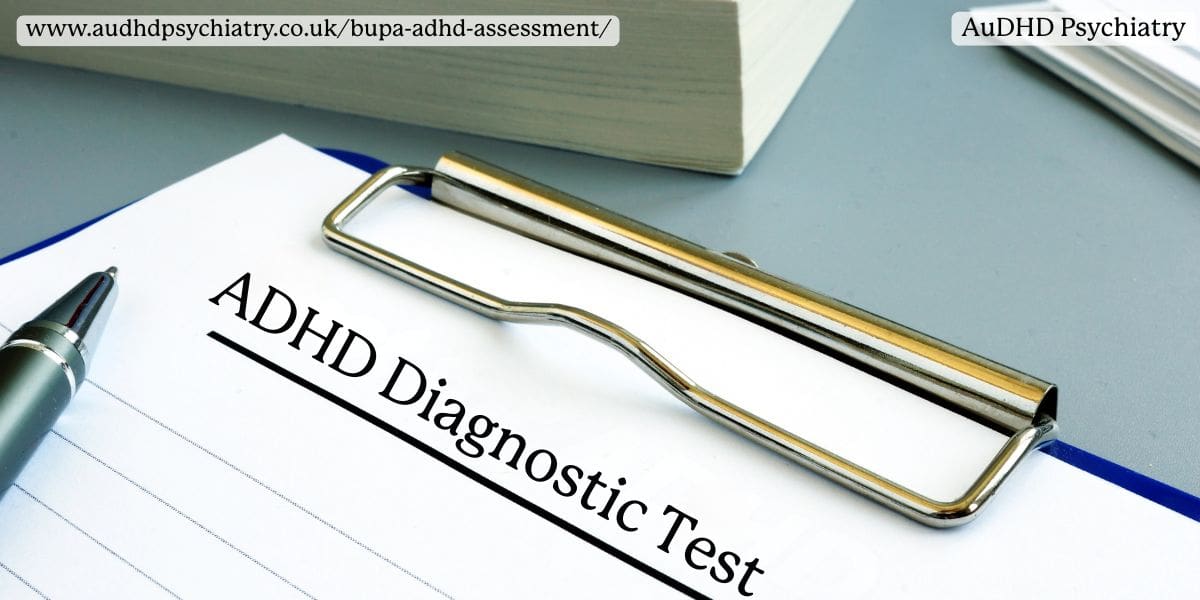
Comprehensive Diagnostic Assessment
Bupa’s comprehensive diagnostic assessment process through AuDHD Psychiatry is designed to gather extensive data through questionnaires, interviews, and behavioral evaluations. A standard psychiatric evaluation alone cannot provide a definitive diagnosis of ADHD or Autism; these conditions require more extensive specialist assessments. The diagnostic assessment is usually carried out by a clinical psychologist or psychiatrist.
Specialist ADHD and Autism assessments typically last between 90 to 120 minutes and include completion of psychological measures, family feedback, and a clinical report. Initial ADHD assessment UK typically involves consultations lasting 90 to 120 minutes. This thorough approach ensures that the diagnosis is accurate and comprehensive, leading to effective treatment plans.
Gathering Information
Gathering information from multiple sources is crucial for a comprehensive Bupa ADHD assessment UK. Insights from home, school, and work environments offer a holistic understanding of the individual’s challenges, revealing behaviour, routines, and interactions within different settings.
Similarly, the school environment offers crucial data, with teachers reporting on focus, behavior, and academic performance. Work environment evaluations provide perspective on how ADHD symptoms manifest in professional settings, informing the assessment process regarding occupational challenges.
Collecting detailed information using an ADHD questionnaire from all these settings allows clinicians to create effective and thoughtful treatment plans.
Diagnostic Interviews
Wondering who can diagnose ADHD? Trained professionals conduct diagnostic interviews, evaluating reported symptoms and observed behaviours. Dr. O Reilly´s approach involves exploring every area of concern for a comprehensive understanding, gathering information from personal interviews and childhood developmental history.
This comprehensive method ensures that the diagnosis is accurate and considers all aspects of the individual’s life. Information from parents, teachers, and the individual themselves is crucial in forming a complete picture of the ADHD symptoms and their impact.
Assessment Outcome
The outcome of the ADHD assessment and diagnostic interview includes a personalised report indicating the next steps for management. The clinician prepares this comprehensive report post-assessment, outlining recommendations and suggesting further evaluation if necessary.
This report offers valuable next steps, ensuring the individual receives appropriate care and support for effective ADHD management.
Tailored Treatment Plans
Following the online ADHD assessment, we provide a detailed diagnostic report with a diagnosis and collaborative treatment plan. ADHD medication effectiveness varies among individuals, often necessitating a personalized treatment approach. Treatment for ADHD is not typically covered by Bupa mental health cover and would need to be self-funded. Cognitive Behavioral Therapy (CBT) has proven significantly effective in alleviating ADHD symptoms. If ADHD treatment is initiated post-assessment, there are mandatory follow-up appointments for medication management.
Other treatment options include Neurofeedback, which may provide long-term improvements in attention and hyperactivity-impulsivity levels for some patients. Behavioural parent training for ADHD is known to reduce family stress and improve home environments.
A multidisciplinary clinical team approach ensures coordinated, ongoing care for adhd UK patients, facilitating communication between various healthcare providers.
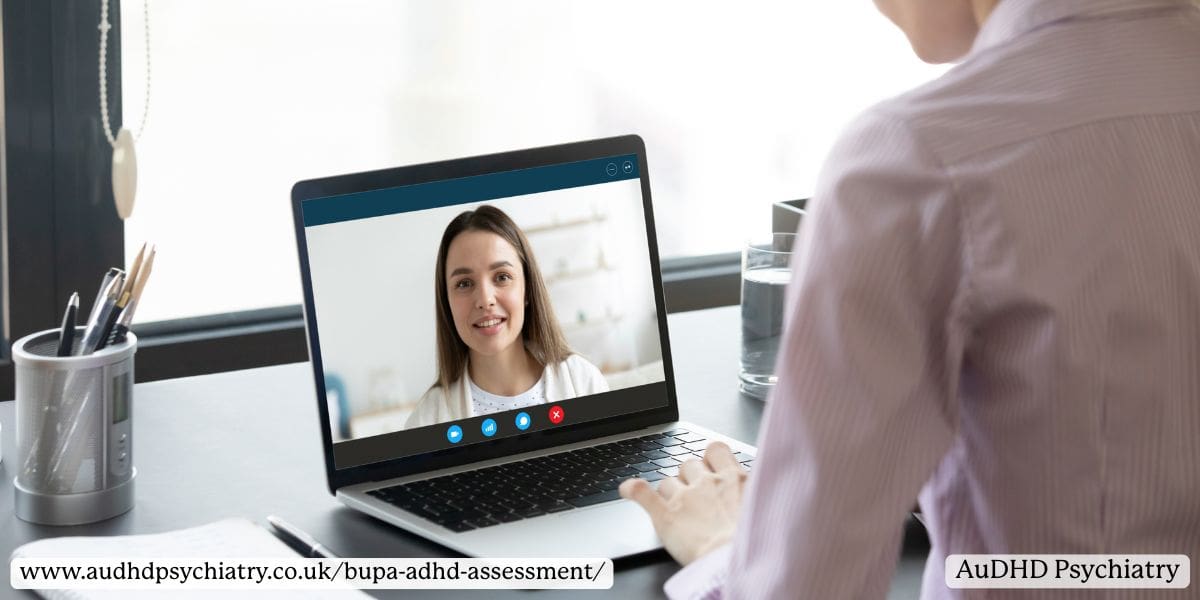
What Happens During Assessment Day
Next, let’s talk about how a Bupa ADHD assessment day goes. Knowing what to expect can help ease nerves or even prevent waiting mode.
Initial consultation steps
The formal psychiatric assessment typically spans 90-120 minutes. Your ADHD specialist will have a proper chat with you about:
- Your life story and medical history
- School or work experiences
- How symptoms pop up in daily life
- The way you handle different situations
Before you show up, you’ll need to fill out some pre-assessment questionnaires. These forms help paint a picture of how ADHD affects your world.
One more important thing is that someone who knows you well (thinks of you as a parent or long-time friend) needs to share their observations, too. Can’t get the forms filled out? No need to worry. Specialists often arrange a 30-minute phone chat with them instead.
Types of tests used
Ready for the assessment? A Bupa ADHD specialist uses proper tools to diagnose ADHD accurately. The primary component is the DIVA-5, a specialist ADHD assessment that typically takes 90-120 minutes. It considers the following factors:
- Current symptom severity – including attention, impulsivity, and hyperactivity traits across different settings
- Occupational and academic impact – such as challenges with concentration, task completion, and organisation at work or school
- Interpersonal functioning – examining how symptoms influence relationships with family, friends, or colleagues
- Daily life management – including routines, executive functioning, and ability to manage time and responsibilities
Other tools might include:
- The Conners-4 questionnaire – checks core ADHD signs
- The Adult ADHD Self-Report Scale – just 6 targeted questions
- The Brown Assessment Scale – 40 questions about attention and memory
Some clinics include a QbTest, which is like a computer game that measures attention, impulse control, and fidgetiness. It’s quite clever, really, because it compares how you do against others your age.
After all this, your specialist matches everything against proper diagnostic rules (the DSM-5 criteria). This helps make sure it’s definitely ADHD and not another condition that may have similar symptoms.
You’ll discuss what they’ve found at the end of your assessment day. In some cases, they might need a bit more information and book you for another session. If not, they’ll explain what happens next and write up a comprehensive report following NICE guidelines.
Understanding Your Bupa ADHD Diagnosis
Got your Bupa ADHD diagnosis results? Let’s make sense of what they mean for you.
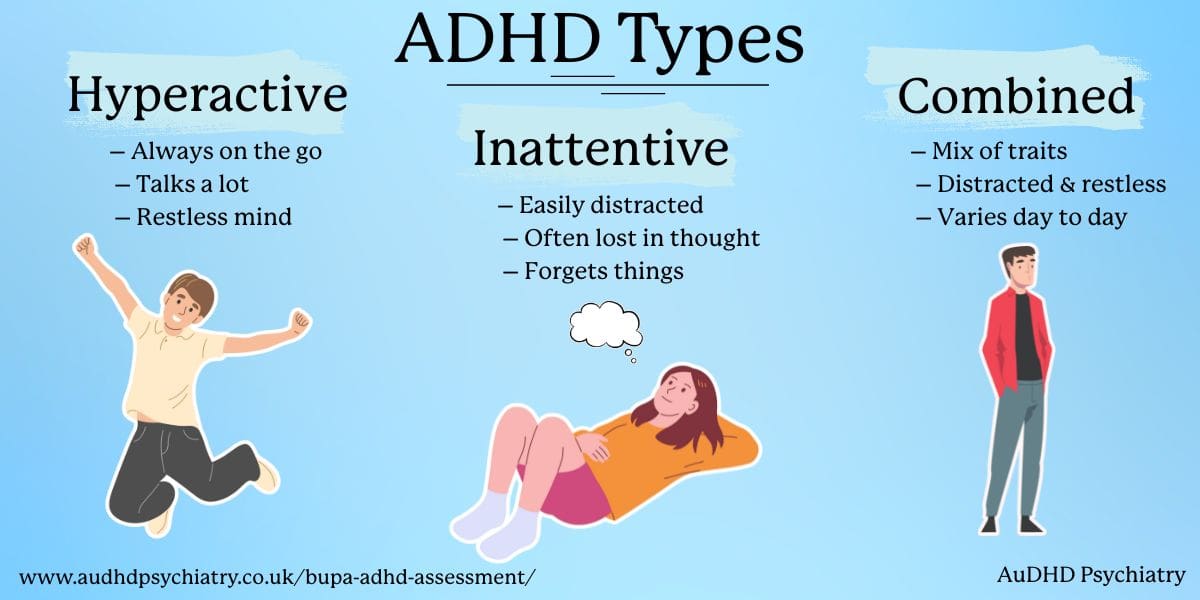
Different ADHD types
The official handbook (DSM-5) talks about three different ways ADHD shows up. Combined type ADHD accounts for 50-75% of all cases. This is the most common, where individuals get both the challenges in focus and hyperactivity.
Remember ADD? Now called inattentive type ADHD, it shows up in 20-30% of cases. If this is you, here are some things you might experience:
- Lose focus during tasks
- Struggle with detailed instructions
- Find it hard to organise things
- Fail to meet deadlines
Hyperactive-impulsive type pops up in about 15% of cases. These individuals might experience:
- A persistent sense of internal restlessness or feeling “driven by a hidden engine”
- Excessive talking or difficulty remaining quiet in structured settings
- Difficulty waiting their turn in activities or conversations
- A tendency to interrupt or intrude on others during discussions or tasks
Severity levels
Doctors look at how much ADHD affects your life and sort it into three groups:
Mild ADHD: Few symptoms beyond diagnostic thresholds; minor impact on daily functioning..
Moderate ADHD: Clear and noticeable functional impairment in academic, occupational, or social domains.
Severe ADHD: Many symptoms causing significant trouble in several areas of life.
Impact on daily life
ADHD is a lifelong neurodevelopmental condition. Approximately 75% of children diagnosed with ADHD continue to exhibit symptoms into adulthood. These symptoms can affect various areas of life:
At work
- Performance goes up and down
- Job-hopping becomes normal
- Deadlines feel like your nemesis
At home
- Daily tasks pile up
- Relationships get rocky
- Keeping life stable feels like hard work
In your brain, you might experience other conditions, such as:
- Depression (58.1%)
- Anxiety (53.1%)
- Sleep troubles (37%)
Knowing your ADHD type and how strong it is helps you figure out proper ways to handle it. Brain scans show less activity in bits that control attention, social judgement, and movement. Understanding this helps explain why you experience things the way you do.
If you’re an adult who needs to manage ADHD in the workplace, this guide might help.
Creating Your Treatment Plan
Got your diagnosis? Let’s sort out how to handle your ADHD. Research shows that mixing different types of help works best for most people with ADHD comprehensive treatment approach.
Available treatment options
Your treatment plan needs to look after your mind, behaviour, and daily life needs. We’ll pick the right mix based on:
- How much ADHD affects your day
- What you want to achieve
- Your personal strong points
- Any other mental health stuff going on
Before jumping in, your specialist will have a proper chat about what might help and what might not. No surprises – you’ll know exactly what you’re getting into.
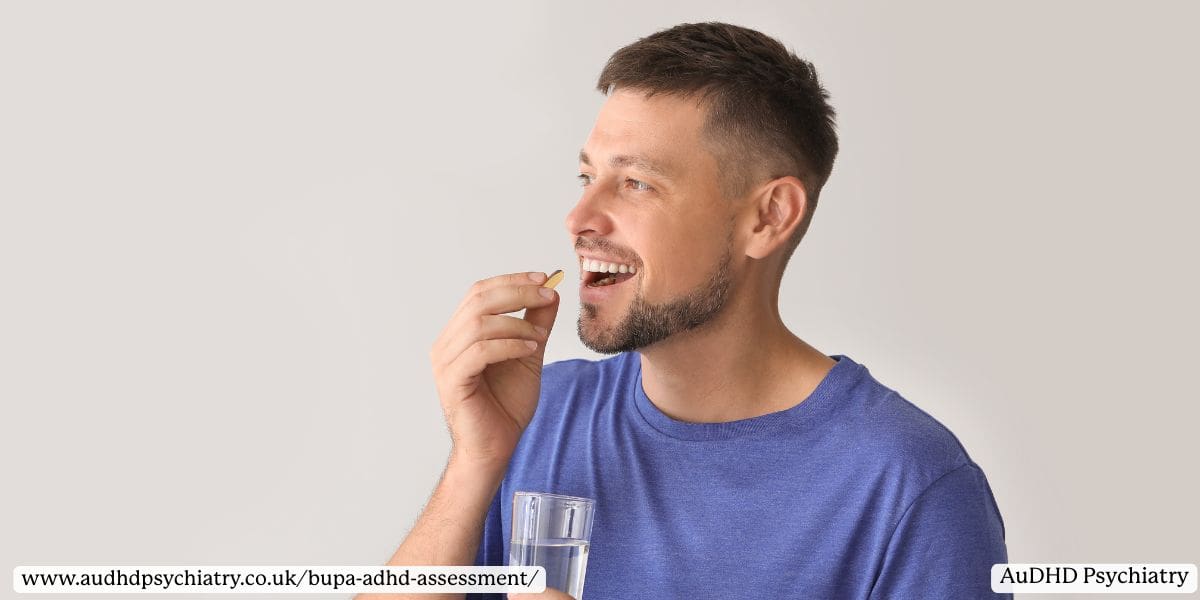
Medication choices
ADHD medication is often the backbone of ADHD treatment options, especially stimulants. The good news? About 80% of people feel better once they find the right stimulant medication.
You have two main options:
Stimulants: These boost your brain’s dopamine and norepinephrine levels, helping you focus better and fidget less. They typically act quickly, though prescribing clinicians will monitor your response and any side effects closely.
Non-stimulants: These might be your ticket if:
- Stimulant medications have not been effective
- Side effects have been difficult to manage
- You need additional support
Therapy possibilities
CBT (Cognitive Behavioural Therapy) is often recommended and functions as structured coaching for executive function challenges. It can help individuals:
- Improve time management
- Strengthen organisational skills
- Develop more deliberate, thoughtful responses
- Address problem-solving difficulties
Additional therapeutic options may include:
- Mindfulness therapy
- Dialectical behaviour therapy
- Occupational therapy
- ADHD coaching
Ongoing Support and Follow-up
Ongoing support for individuals with ADHD includes regular follow-up appointments to assess treatment effectiveness and make adjustments, and explore options to transfer your ADHD care seamlessly if needed. A tailored treatment plan may include therapy sessions, counselling, and other mental health support.
Bupa’s expert team ensures that patients receive the ongoing support they need to manage their ADHD symptoms effectively. The staff at assessment centers are described as professional and supportive by patients. This comprehensive approach helps individuals navigate their treatment pathways with confidence and clarity.
Why Choose Bupa for ADHD Assessments?
Opting for Bupa and AuDHD Psychiatry for ADHD assessments offers numerous benefits, including access to specialized professionals and resources. Bupa collaborates with consultants experienced in neurodiversity, ensuring high standards of care and diagnostic methods.
Additionally, AuDHD Psychiatry provides access to consultations and assessments online, making it convenient for patients to receive the care they need. Comprehensive online assessments for ADHD are offered by private providers, making them accessible. The comprehensive and patient-focused services offered ensure that individuals receive the best possible support throughout their ADHD assessment journey.
You can consult with our experts for ADHD assessments and follow-up appointments without having to experience long wait times for NHS assessments.
Additional Services Offered
Bupa collaborates with AuDHD Psychiatry, a provider specializing in neurodevelopmental assessments and therapies, to extend their services to clients. This partnership allows Bupa to offer comprehensive autism assessments alongside their existing ADHD services.
The additional services offered by Bupa enhance the overall support available for both ADHD in children and adults experiencing mental health challenges. Bupa is dedicated to providing a wide range of mental health services to meet the diverse needs of their clients, including outpatient psychological therapy and post-diagnostic support.
Your Bupa ADHD Assessment Journey At A Glance
We’ve shared in-depth information about the Bupa ADHD assessment throughout the article. If you want to review the important points we’ve discussed quickly, refer to this section for an at-a-glance recap, including details on adult autism diagnosis with BUPA.
How do I book an ADHD assessment through Bupa?
To book an ADHD assessment through Bupa, contact their dedicated client team via the specific form on their website or by phone during business hours, from Monday to Friday, 9 AM to 6 PM. A standard psychiatric assessment is a formal evaluation that examines difficulties and makes treatment recommendations.
What happens during the initial consultation?
During the initial consultation, a detailed interview is conducted to gather information about the individual’s symptoms and challenges, typically lasting between 60 to 90 minutes. This process is crucial for understanding the client’s needs and forming a basis for diagnostic treatment.
What does the comprehensive diagnostic assessment involve?
A comprehensive diagnostic assessment involves questionnaires, clinical interviews, and behavioral evaluations to collect extensive data, typically lasting 90 to 120 minutes. This process includes psychological measures, family feedback, and culminates in a detailed clinical report. Additional tools, such as the DIVA-5 or QbTest, may also be used.
What kind of support can I expect after the assessment?
You’ll receive a personalised diagnostic report and treatment recommendations. This may include stimulant or non-stimulant medications, CBT, or other therapies, tailored to the type and severity of ADHD identified.
You can expect continuous support from Bupa and AuDHD Psychiatry, including regular follow-up support, therapy sessions, and counseling for effective ADHD symptom management.
How long does a Bupa ADHD assessment typically take?
A Bupa ADHD assessment usually involves multiple steps. The initial psychiatric consultation lasts about 40-50 minutes, while the comprehensive DIVA-2 assessment can take 90-120 minutes. Additional questionnaires and tests may also be required, making the entire process thorough and detailed.
Does Bupa have ADHD Insurance Coverage?
While Bupa covers ADHD assessments, coverage for follow-up treatment may vary based on pre-existing conditions. It’s essential to verify your policy terms and request authorisation for any standard psychiatric assessments.
FAQs
Does Bupa cover ADHD assessments for adults only, or also for children?
Bupa may fund ADHD assessments for both adults and children, depending on the policy and referral route. Some policies have age-specific criteria or require additional authorisation for child assessments, so it’s important to confirm eligibility before booking.
Do I need a GP referral for a Bupa ADHD assessment?
In many cases, Bupa does not require a GP referral, but you will usually need authorisation from Bupa before attending an assessment. Some policies may still recommend GP involvement to support continuity of care.
How long does it take to get a Bupa ADHD assessment?
Our Bupa-funded ADHD assessments are typically much faster than NHS routes. Many patients complete the full process from initial consultation to diagnostic report within a weeks, depending on availability and information gathering.
Is a Bupa ADHD diagnosis recognised by the NHS and employers?
A formal ADHD diagnosis from a Bupa-approved specialist is clinically valid and can be recognised by employers, universities, and GPs. However, shared-care agreements for medication remain at the discretion of local NHS services.
Does Bupa cover ADHD medication after diagnosis?
Bupa mental health cover usually focuses on assessment rather than long-term medication costs. ADHD medication and ongoing prescribing are often self-funded unless transferred to NHS shared care.
Bupa ADHD Assessment: Conclusion
Summing up, Bupa’s ADHD assessments through AuDHD Psychiatry provide a thorough and compassionate approach to diagnosing and managing attention deficit hyperactivity disorder. From the initial consultation to the comprehensive diagnostic assessment, Bupa ensures that each individual receives a personalized and effective treatment plan.
Choosing Bupa and AuDHD Psychiatry means gaining access to specialized professionals, comprehensive services, and ongoing support that can make a significant difference in managing ADHD. Take the first step today by booking an appointment with us and experience accurate diagnosis and tailored care.
When you’re weighing your options, check out our guide on NHS vs Private ADHD Assessment (2025) for a clear comparison.
If you’re exploring autism or overlapping traits alongside ADHD under Bupa, see our Bupa Adult Autism Assessments for a streamlined, insurer-approved pathway.
References
[1] – https://www.nhs.uk/conditions/attention-deficit-hyperactivity-disorder-adhd/symptoms/
[2] – https://www.healthline.com/health/adhd/adult-adhd
[3] – https://www.cdc.gov/adhd/diagnosis/index.html
[4] – https://www.mayoclinic.org/diseases-conditions/adult-adhd/symptoms-causes/syc-20350878
[5] – https://www.nimh.nih.gov/health/publications/adhd-what-you-need-to-know
[6] – https://chadd.org/for-adults/diagnosis-of-adhd-in-adults/
[7] – https://adhdaware.org.uk/what-is-adhd/getting-nhs-diagnosis/
[8] – https://thinkadhd.co.uk/for-patients/nhs-vs-private-adhd-assessment/
[9] – https://onebright.com/bupa-adhd-assessment/
[10] – https://www.bupa.co.uk/health/health-assessments/forms/booking-request
[11] – https://adhduk.co.uk/right-to-choose/
[12] – https://umid.co.uk/drbaig/bupa-funded-adhd-or-autism-assessments
[13] – https://www.theoaktreepractice.com/services/assessments/adhd-assessments/
[14] – https://www.medicalnewstoday.com/articles/adhd-screening
[15] – https://www.nice.org.uk/news/articles/nice-recommends-digital-technology-to-help-diagnose-adhd-in-children-and-young-people
[16] – https://psychiatry-uk.com/adhd-what-to-expect-from-an-adhd-assessment/
[17] – https://www.adhdcentre.co.uk/understanding-adhd-the-3-different-types-and-their-symptoms/
[18] – https://chadd.org/about-adhd/overview/
[19] – https://www.medicalnewstoday.com/articles/adhd-spectrum
[20] – https://magazine.medlineplus.gov/article/adhd-across-the-lifespan-what-it-looks-like-in-adults
[21] – https://novopsych.com.au/assessments/diagnosis/adult-adhd-self-report-scale-asrs/
[22] – https://www.additudemag.com/faq-about-adhd/?srsltid=AfmBOoqs1zPtitlgL4toN7qwWNOL2bW8dv4aAI865nexYWZRzKCsqBPa
[23] – https://nwknowledgenow.nhs.uk/wp-content/uploads/2024/07/GuidelineADHDinCYP_PPMO_ADHD_01062026.pdf
[24] – https://my.clevelandclinic.org/health/treatments/11766-adhd-medication
[25] – https://www.mayoclinic.org/diseases-conditions/adult-adhd/diagnosis-treatment/drc-20350883
[26] – https://add.org/adhd-therapies/
[27] – https://www.additudemag.com/adhd-lifestyle-changes-food-sleep-exercise-genes-environment/?srsltid=AfmBOooLHTFC7IizTNtCsuz8gKJbXzHsOSS5WG8cDNUAW0LgrqielTdX
[28] – https://www.webmd.com/add-adhd/living-well-adult-adhd
[29] – https://www.adhdcentre.co.uk/how-to-live-a-healthy-lifestyle-with-adhd/
You Might Also Like
Contact Us
We’re here to answer any questions you might have.
Get in Touch
Opening Hours
Contact Form
We’re here to help. Reach out and we’ll get back to you within 24 hours (Monday – Friday).

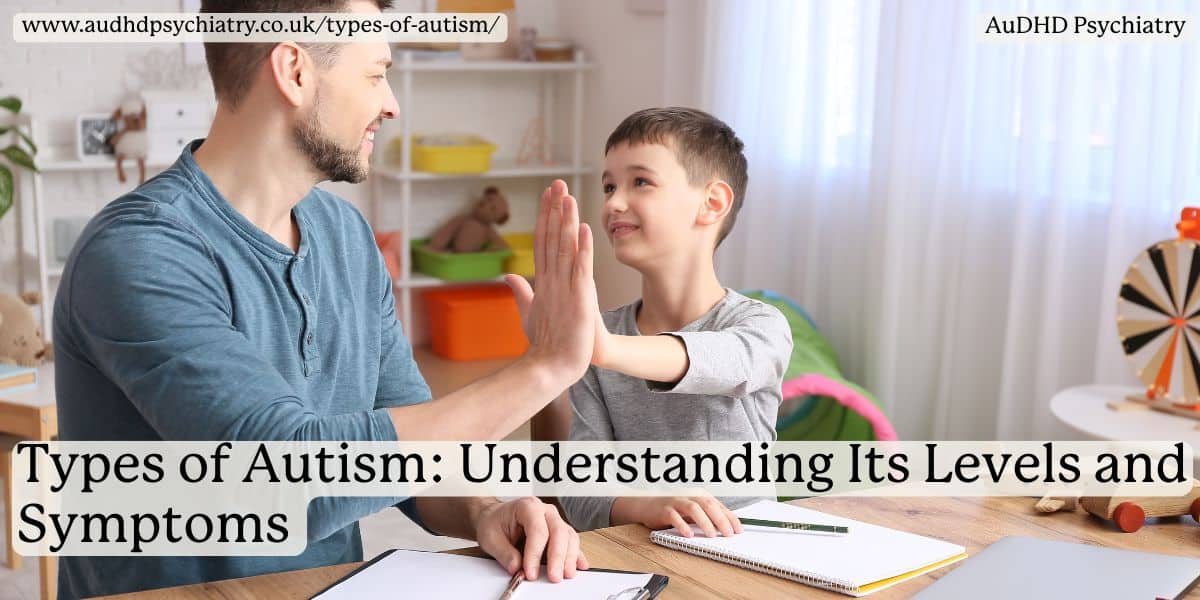
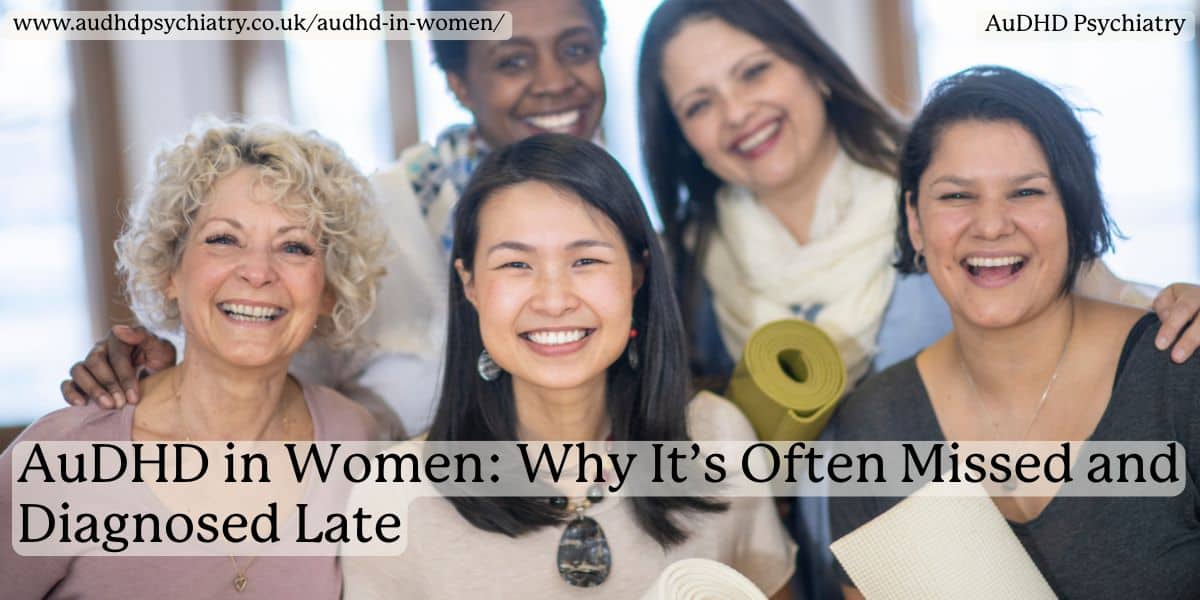
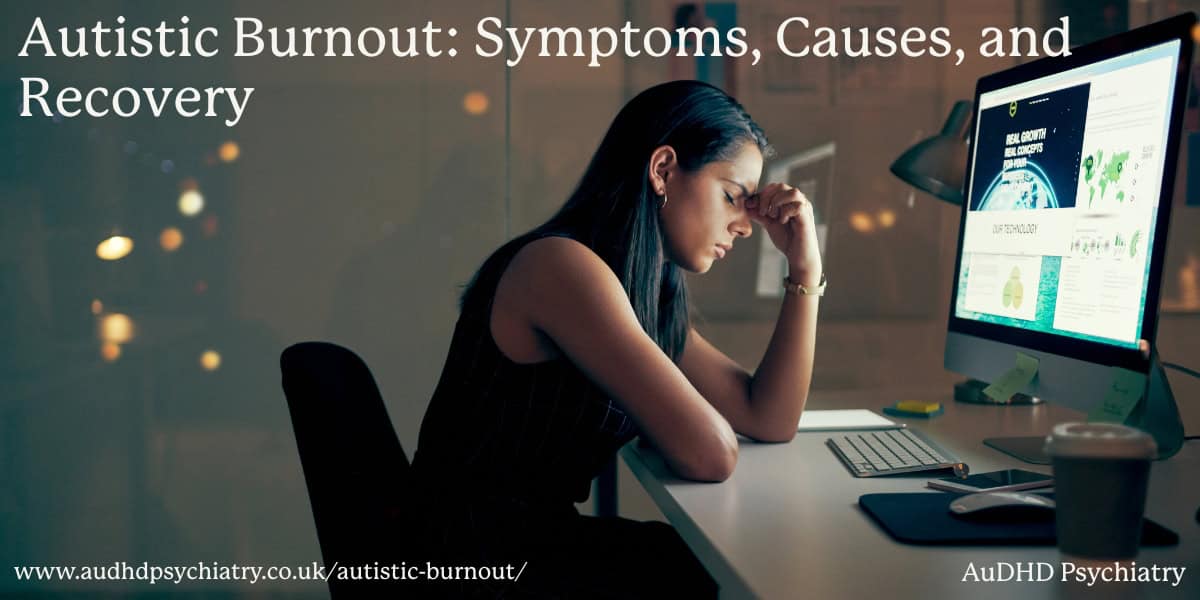
Leave a Reply